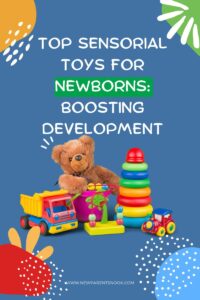Some links on our blog are affiliate links, meaning at no extra cost to you, we may earn a commission if you purchase through them. We participate in the Amazon Affiliate Program, and we recommend products we believe in. Your support helps us keep providing valuable content. Thank you!
Welcoming a new baby into the world is an adventure filled with joy, challenges, and countless firsts.
As parents and caregivers, it’s natural to wonder about the developmental milestones your baby should be reaching and when.
Understanding these milestones can help you support your child’s growth and provide the right stimulation at every stage.
This comprehensive guide covers the key milestones from birth to 24 months, offering insights into the physical, cognitive, and emotional development you can expect to see in your little one, month by month.
0-3 Months: The Foundation
- Physical Milestones: In these early months, your baby will start lifting their head during tummy time, focus on faces, and begin to follow objects with their eyes. Reflexes like grasping and sucking are strong.
- Cognitive Milestones: Your baby will start to recognize your voice and face, and begin responding to loud sounds. They will also show early signs of communication by cooing and making gurgling sounds.
- Emotional Milestones: Comfort from cuddling and the sound of familiar voices are crucial. You’ll notice your baby calming down with soothing and starting to smile socially by the end of this period.
4-6 Months: Exploration Begins
- Physical Milestones: Expect your baby to roll over in both directions, sit with support, and possibly start to support their weight on legs when held upright. They’ll also grasp toys and bring hands or objects to their mouth.
- Cognitive Milestones: They’ll show curiosity about objects and start to understand cause and effect, such as shaking a rattle to make noise. Babbling becomes more complex.
- Emotional Milestones: Your baby will begin to express joy through laughter and may start to show displeasure when play stops or toys are taken away.
7-9 Months: Becoming Independent
- Physical Milestones: Sitting without support, starting to crawl, and possibly standing with assistance mark this phase. Fine motor skills improve, allowing your baby to pick up small objects with a pincer grasp.
- Cognitive Milestones: Object permanence develops; your baby will now look for hidden objects. Understanding of basic gestures and commands improves.
- Emotional Milestones: Separation anxiety may begin. Your baby will show clear preferences for certain people and toys.
10-12 Months: First Steps and Words
- Physical Milestones: Many babies start to walk independently during this stage. They can also clap hands, wave goodbye, and point to objects or people.
- Cognitive Milestones: Your baby might say their first words and understand simple instructions. They’ll also explore objects in different ways, like banging or throwing them.
- Emotional Milestones: Expect your baby to test boundaries as they become more independent. They may show specific preferences and form strong attachments to caregivers.
13-18 Months: Rapid Expansion
- Physical Milestones: Improved walking and the ability to climb onto furniture. Fine motor skills advance, allowing for scribbling and building with blocks.
- Cognitive Milestones: Your toddler will start to solve problems through trial and error, recognize names of familiar people and objects, and show interest in picture books.
- Emotional Milestones: Play will become more imaginative. Your toddler may have tantrums due to frustration or difficulty expressing themselves.
19-24 Months: Toward Autonomy
- Physical Milestones: Running, jumping, and kicking balls are new physical feats. Your child will also start to use utensils more effectively and may show readiness for potty training.
- Cognitive Milestones: Language skills will rapidly expand, with sentences forming. Your toddler will begin to understand simple stories and follow two-step instructions.
- Emotional Milestones: They will exhibit a desire for independence but may also show reluctance to share toys. Recognition of self in a mirror reflects growing self-awareness.
Each child is unique and may reach these milestones at their own pace.
This guide offers a general framework for what parents and caregivers can watch for, but it’s important to remember that variation is normal.
If you have concerns about your child’s development, consult with a healthcare provider for personalized advice and support.
Celebrating each milestone, big or small, is a beautiful part of the journey of growth from newborn to toddler.







